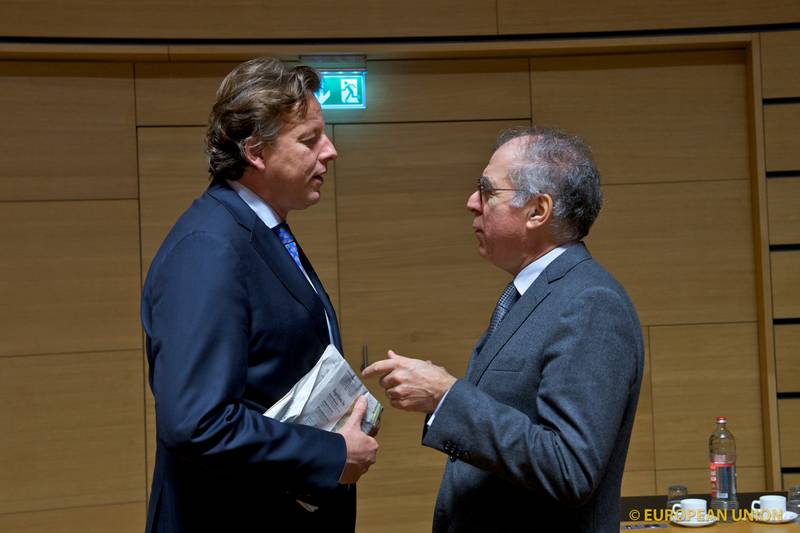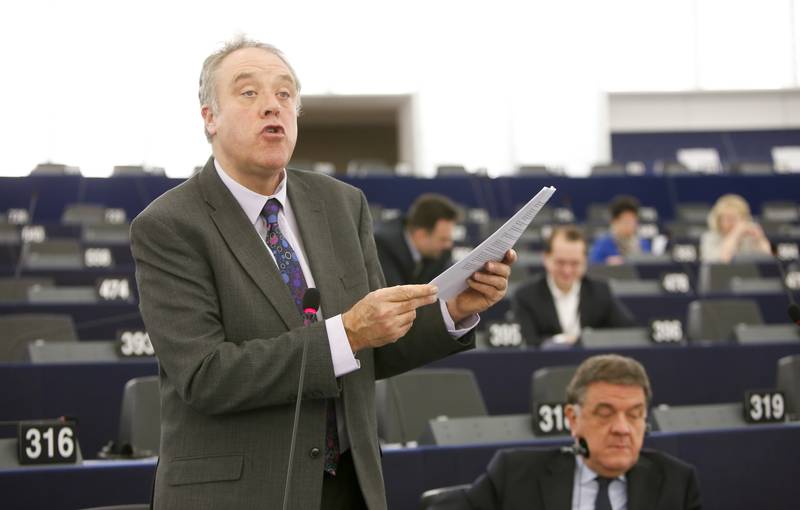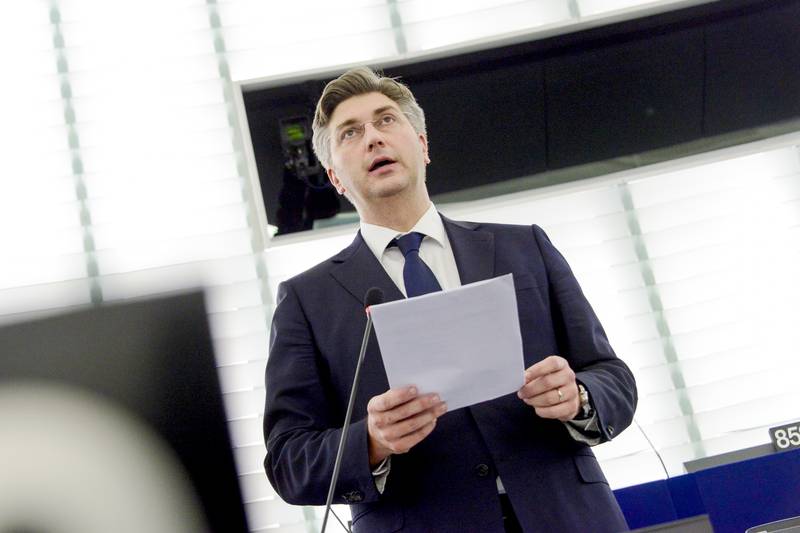Koenders: EU Will Either Export Stability, or Import Instability
Adelina Marini, January 15, 2016
 A time of reckoning has come for the EU. The Union must show that it is not just an organisation for the good times, but can also cope with the bad times, for the alternative is either the EU will export stability, or import instability. This is what Dutch Foreign Minister Bert Koenders said, whose country has taken over the presidency of the Council of the EU on January 1st. He met with MEPs from the foreign committee of the European Parliament to present his priorities to them. And while he was brief and concise, focusing on the EU’s main problem, namely the lack of a strong foreign policy vision, the MEPs drowned him in all the foreign affairs problems that the Union is surrounded by – from Russia, through the Balkans, to Iran and Saudi Arabia. The minister was forced to remind that many things had changed since the last Dutch presidency back in 2004. The Lisbon Treaty introduced the position of a High Representative for Foreign Affairs and Security Policy, who, as Brussels jargon goes, wears two hats – heads the EU’s new foreign office, but is a member of the Commission as well.
A time of reckoning has come for the EU. The Union must show that it is not just an organisation for the good times, but can also cope with the bad times, for the alternative is either the EU will export stability, or import instability. This is what Dutch Foreign Minister Bert Koenders said, whose country has taken over the presidency of the Council of the EU on January 1st. He met with MEPs from the foreign committee of the European Parliament to present his priorities to them. And while he was brief and concise, focusing on the EU’s main problem, namely the lack of a strong foreign policy vision, the MEPs drowned him in all the foreign affairs problems that the Union is surrounded by – from Russia, through the Balkans, to Iran and Saudi Arabia. The minister was forced to remind that many things had changed since the last Dutch presidency back in 2004. The Lisbon Treaty introduced the position of a High Representative for Foreign Affairs and Security Policy, who, as Brussels jargon goes, wears two hats – heads the EU’s new foreign office, but is a member of the Commission as well.
Because of these two functions the High Representative chairs the foreign ministers’ meetings. At the moment this post is occupied by Federica Mogherini (Italy, Socialists and Democrats). After all, the presidency can set the agenda of the Foreign Affairs Council. During the Koenders hearing, it was mentioned on several occasions that the EU should no longer be just a symbol of soft power. Hardening is also necessary. Mr Koenders agreed, stating he expected that by the end of the presidency (June 30) the new foreign policy and defence strategy of the Union would be ready, which should be much more political in his words. “We can’t just talk about [it] anymore”, he said. Word is of the new global strategy of the EU, which is to succeed the strategy, proposed by Federica Mogherini’s predecessor Javier Solana back in the year 2003.
The leaders of member states have charged Ms Mogherini with developing the new strategy by June of 2016, which is to include fighting terrorism and organised crime, cyber security, energy and climate change, migration and mobility, and the other usual subjects for such documents. It did not become clear from Bert Koenders’ speech exactly what did he have in mind when he said that it was necessary that the EU’s foreign policy became more political. This, however, is in sync with the new European fashion line, after the EC President Jean-Claude Juncker announced at his election to the post that he wished to make the EC more political. This means a political, rather than technocratic approach to rules and founding principles of the EC. In other words, it means flexibility with rules application.
It seems like The Netherlands has matured to such an approach, at least concerning foreign policy, for Minister Koenders mentioned during the hearing that it was important for the EU to be strict and adhere to its principles regarding enlargement countries, but it is of no less importance that it takes into account the geopolitical context and keep the process dynamics consistent with it. In this sense, Bert Koenders admitted that the mobilisation in the enlargement process with Turkey was due to the geopolitical factor as well. “The opening of a new chapter in the negotiations with Turkey is happening in the context of enlargement, but also of geopolitical events”, he said during the hearing, which lasted for an hour and a half. All candidate states more or less have problems with the rule of law. We should, however, keep in mind at every stage what the correct dynamics are, explained The Netherlands’ top diplomat, without going into detail.
Yes to the opening of Chapters 23 and 24

This is what British MEP Richard Howitt (Socialists and Democrats, Great Britain) insisted on. Koenders agreed that it was important to open specifically these two chapters, which cover the most problematic areas in candidate states and which, according to the EC’s new approach, are opened at the very beginning of the negotiation process and are the last to be closed. Turkey started the negotiations before the change in approach and Serbia after it, but both still have these two chapters not opened. Koenders expressed hope that this would happen during the Dutch presidency, but the case of Turkey is a little more complicated, for the opening of these exact chapters is blocked by Cyprus. If there is any movement on the Cyprus issue, then the veto will be lifted. The Dutch minister was cautious in his expectations, but stressed that he hoped a success is possible, for at the moment there are good conditions created for it.
Uncertainty in the Bosnia and Herzegovina candidacy
Bert Koenders was not so definitive on the issue what is to be done when Bosnia and Herzegovina applied for membership. This is expected to happen next week. The Dayton state has attempted to file an application on several occasions, but was discouraged by the EU. In the past, it was because there was a lack of any progress whatsoever on the Union’s priorities at the time – implementing the European Court of Human Rights’ ruling on the Sejdić-Finci case, the creation of a coordination mechanism on European affairs and deep reforms. Nothing of this is a fact, but the situation with BiH changed dramatically last year after the EU agreed to change its approach. The stabilisation and association agreement was defrosted and a positive climate was created in the country. The High Representative and member states, however, are cautious about the next step – applying for membership.
According to Federica Mogherini, this application should be credible, meaning a serious effort must stand behind it. To the EU, this will be the next challenge whether it will manage to make the right decision. Croatia is firmly for the Union to accept the application. Croatian MEPs were especially active during the hearing in the foreign affairs committee of the EP, insisting that the Dutch presidency did whatever is necessary. According to Andrej Plenković (EPP), BiH’s membership will be the glue that will hold the country together and functioning. He directly asked the Dutch foreign minister to accept the BiH application. His colleague Dubravka Šuica (EPP) backed him, reminding that the geopolitical context is extremely important. In accordance with the principle of exporting stability and not importing instability, the EU must have an inclusive  approach towards Bosnia and Herzegovina, especially keeping the geopolitical context in mind. One of your priorities must be accepting BiH’s membership application, she pointed out.
approach towards Bosnia and Herzegovina, especially keeping the geopolitical context in mind. One of your priorities must be accepting BiH’s membership application, she pointed out.
The Dutch diplomat replied that if BiH filed an application, the presidency would receive it and forward it to the Council. Member states are the ones that need to approve it. He was criticised by Romanian MEP Cristian Dan Preda (EPP), who is Rapporteur on BiH, because the word “enlargement” is totally absent from the presidency’s programme. According to him, it is crucial how the EU would react to the incoming membership application by BiH.
Translated by Stanimir Stoev
 Bakir Izetbegovic, Andrej Plenkovic | © Council of the EU
Bakir Izetbegovic, Andrej Plenkovic | © Council of the EU Aleksandar Vucic, Recep Tayyip Erdogan | © Serbian Presidency
Aleksandar Vucic, Recep Tayyip Erdogan | © Serbian Presidency Jean-Claude Juncker, Zoran Zaev | © European Commission
Jean-Claude Juncker, Zoran Zaev | © European Commission